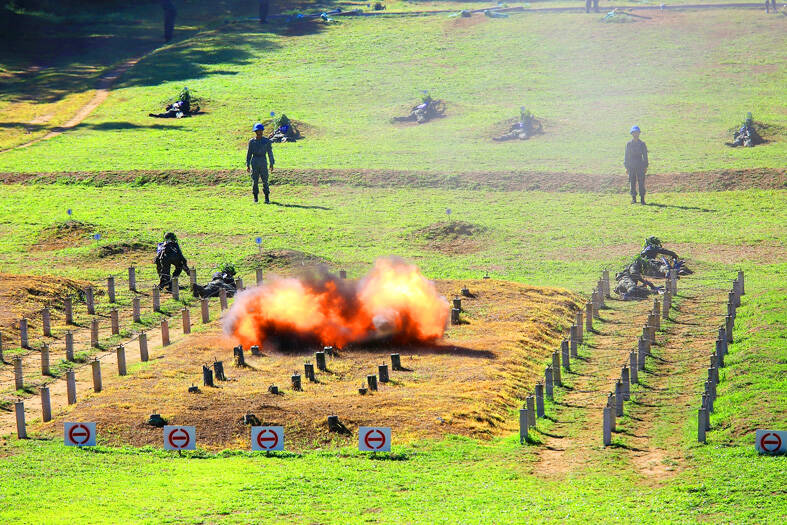The Chungshan Institute of Science and Technology has developed a polycyclic nitroamine explosive, commonly known as CL-20, which is the most powerful non-nuclear explosive known, a government source said yesterday on condition of anonymity.
The institute has significantly improved explosive and rocket propellant research and development in recent years, the source said.
A new factory was established in June 2022 with NT$540 million (US$16.6 million) in equipment installed, the source said.

Photo copied by Chen Wen-chan, Taipei Times
A central complex that would house 50-gallon (189 liters) and 300-gallon (1,136 liters) explosive mixer machines, as well as a storage device, was constructed in the factory, the institute said.
The explosive is 40 percent more powerful than those currently used and could be deployed for Hsiung Feng II (“Brave Wind” II, HF-II) and HF-III missiles, the source said.
The source did not comment on what other type of domestically manufactured missiles would be compatible with the CL-20 compound.
However, the institute has the intellectual property rights to all development and manufacturing of products using CL-20, and may authorize its use and production outside of the institute in favor of growing the national defense industry, the source added.
The US, the EU, China and Russia have also researched and made the compound, but due to its high-technical barrier and manufacturing costs, it has not entered commercial production, the source said.
Despite difficulties in mass production, CL-20 has seen some minor uses within the US and China, and has also been used in the Russia-Ukraine war, the source said.
The institute carries the heavy responsibility of researching and developing explosive compounds for the national defense sector, which has become even more important following the passage of the Sea-Air Combat Power Improvement Plan Purchase Special Regulation (海空戰力生計畫採購特別條例) and the increased production of missiles of all types, the source said.
The research and development of rocket propellants was a significant task, the institute said, adding that it was building a solid foundation for basic production capabilities.
To achieve this, the institute said it has ensured that the compound mixing and propellant research areas are safe, equipped with up-to-date machinery and technology, and are comfortable to work in.
In tandem with domestic companies, the institute has researched and built a 1,136-liter mixer from the ground up, further enhancing the autonomy of Taiwan’s national defense sector.

Right-wing political scientist Laura Fernandez on Sunday won Costa Rica’s presidential election by a landslide, after promising to crack down on rising violence linked to the cocaine trade. Fernandez’s nearest rival, economist Alvaro Ramos, conceded defeat as results showed the ruling party far exceeding the threshold of 40 percent needed to avoid a runoff. With 94 percent of polling stations counted, the political heir of outgoing Costa Rican President Rodrigo Chaves had captured 48.3 percent of the vote compared with Ramos’ 33.4 percent, the Supreme Electoral Tribunal said. As soon as the first results were announced, members of Fernandez’s Sovereign People’s Party

MORE RESPONSIBILITY: Draftees would be expected to fight alongside professional soldiers, likely requiring the transformation of some training brigades into combat units The armed forces are to start incorporating new conscripts into combined arms brigades this year to enhance combat readiness, the Executive Yuan’s latest policy report said. The new policy would affect Taiwanese men entering the military for their compulsory service, which was extended to one year under reforms by then-president Tsai Ing-wen (蔡英文) in 2022. The conscripts would be trained to operate machine guns, uncrewed aerial vehicles, anti-tank guided missile launchers and Stinger air defense systems, the report said, adding that the basic training would be lengthened to eight weeks. After basic training, conscripts would be sorted into infantry battalions that would take

EMERGING FIELDS: The Chinese president said that the two countries would explore cooperation in green technology, the digital economy and artificial intelligence Chinese President Xi Jinping (習近平) yesterday called for an “equal and orderly multipolar world” in the face of “unilateral bullying,” in an apparent jab at the US. Xi was speaking during talks in Beijing with Uruguayan President Yamandu Orsi, the first South American leader to visit China since US special forces captured then-Venezuelan president Nicolas Maduro last month — an operation that Beijing condemned as a violation of sovereignty. Orsi follows a slew of leaders to have visited China seeking to boost ties with the world’s second-largest economy to hedge against US President Donald Trump’s increasingly unpredictable administration. “The international situation is fraught

GROWING AMBITIONS: The scale and tempo of the operations show that the Strait has become the core theater for China to expand its security interests, the report said Chinese military aircraft incursions around Taiwan have surged nearly 15-fold over the past five years, according to a report released yesterday by the Democratic Progressive Party’s (DPP) Department of China Affairs. Sorties in the Taiwan Strait were previously irregular, totaling 380 in 2020, but have since evolved into routine operations, the report showed. “This demonstrates that the Taiwan Strait has become both the starting point and testing ground for Beijing’s expansionist ambitions,” it said. Driven by military expansionism, China is systematically pursuing actions aimed at altering the regional “status quo,” the department said, adding that Taiwan represents the most critical link in China’s